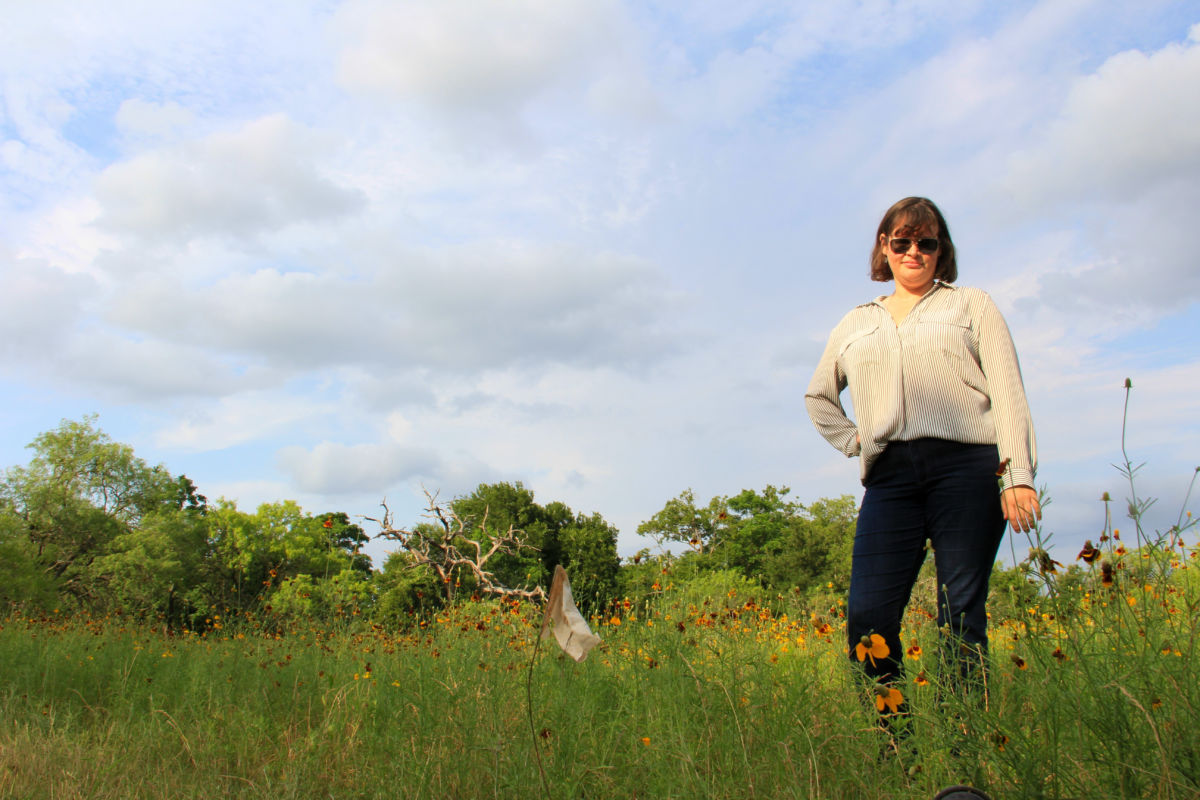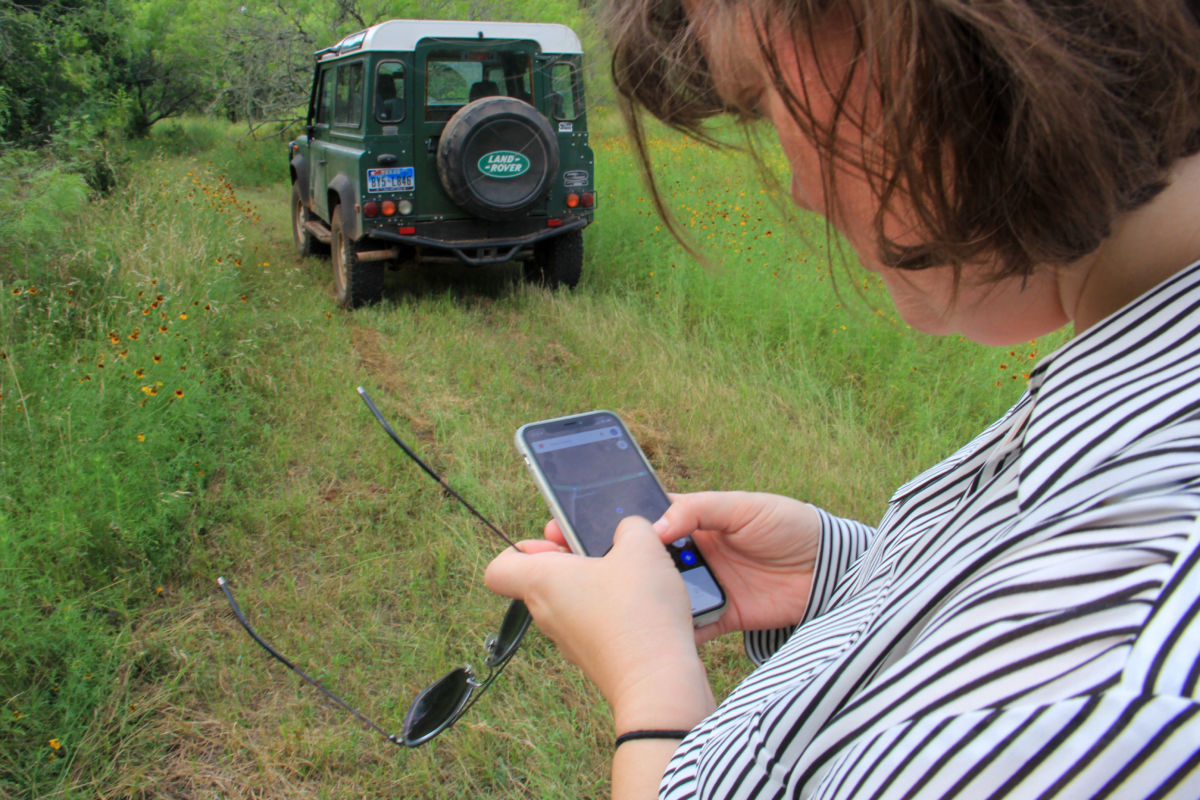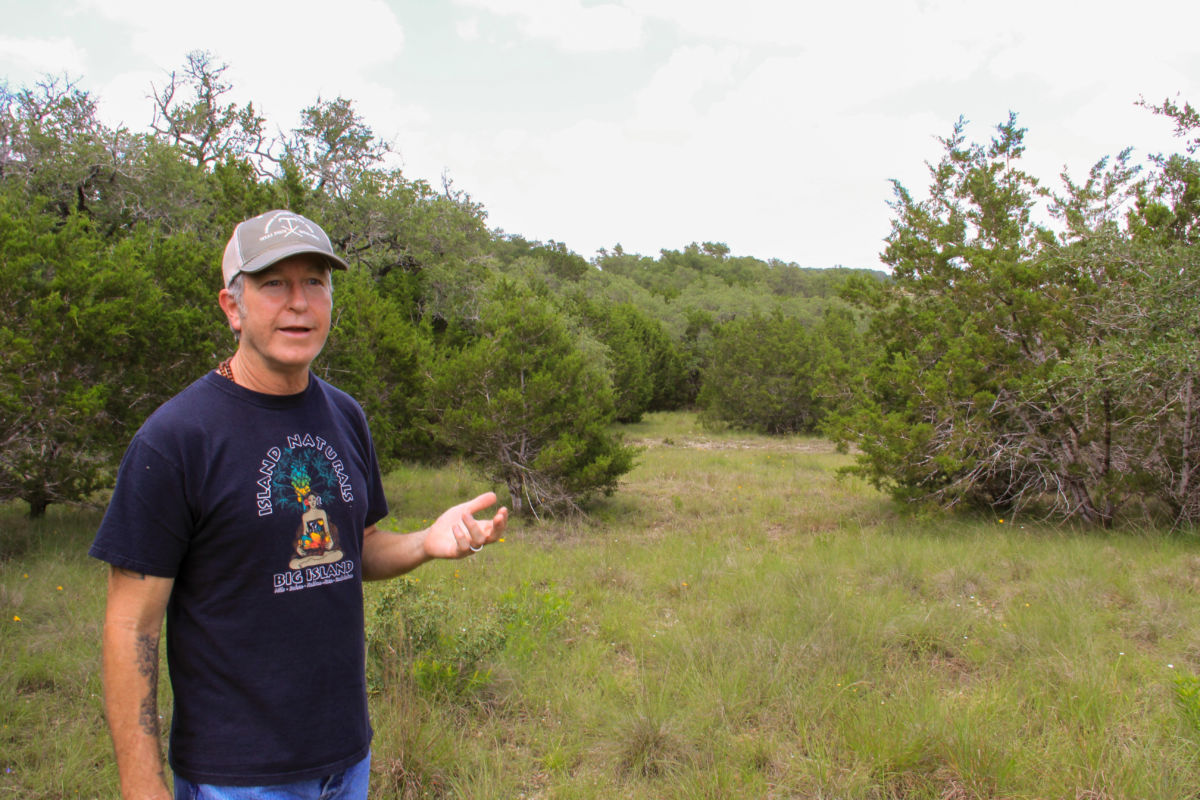Part of the Series
Planet or Profit
For many environmentalists and landowners in Texas’s iconic Hill Country, Kinder Morgan’s 42-inch Permian Highway Pipeline is aptly named.
The company’s planned 430-mile southeasterly route from West Texas to the Gulf would irrevocably scar this ecologically sensitive region, long defined by its porous hills of limestone that has, until now, managed to largely avoid oil and gas development in a state so defined by it.
The $2 billion pipeline project is part of the industry’s Trump-backed race to build oil and gas pipelines from the nation’s most active oil patch in West Texas’s Permian Basin to refineries near Houston and Corpus Christi — and eventually to the Gulf so that the Trump administration’s “molecules of U.S. freedom” can be “exported to the world.”
But for those who live along the proposed route, the fracked gas pipeline is yet another symbol of the fossil fuel industry’s race to accelerate the climate emergency and the Earth’s ongoing sixth mass extinction — a highway to the next Permian extinction event literally fueled by the last one.
Several landowners along the route told me the same story when I visited them on their land: Kinder Morgan is bullying them into signing away their property at prices well below what it’s worth, and the pipeline’s impacts would be incalculable.
These landowners, alongside environmentalists and other concerned residents, recently packed a courtroom in downtown Austin this month as a judge heard arguments in a lawsuit filed by Hays County, the city of Kyle and three landowners over the state’s flimsy eminent domain process. That process allows oil and gas companies to condemn private property by merely checking a box claiming “common carrier” status on a one-page form.
Kinder Morgan and the state’s oil and gas regulatory body, the Texas Railroad Commission, are trying to dismiss the lawsuit, which asks for a temporary injunction to stop any condemnations in Texas’s Gillespie, Blanco and Hays Counties until a trial can be held.
“We’re very concerned about the potential for pollution and a leak into the aquifers.”
Despite the fact that most of the 2 billion cubic feet of fracked gas that will move through the pipeline each day is intended for export, Kinder Morgan maintains that the pipeline is in the public interest because it will generate nearly $1 billion for state and county revenues annually. Leaseholders in the Permian Basin will earn far more than that, making more than $2 billion per year in royalties once production bottlenecks in West Texas are eased up.
But members of the Texas Real Estate Advocacy and Defense Coalition argue, however, that the pipeline’s path threatens residential areas situated in what’s being called the “incineration zone” — an area far exceeding the pipeline’s easement that is at risk in the event of an explosion.
“Putting a Pipeline on Swiss Cheese”
The pipeline’s opposition isn’t just limited to those living directly in its path. Environmental activists and conservation groups are raising alarms about the pipeline’s potential impacts on the land’s sensitive karst topography, characterized by underground cavities, fractures and drainage systems that feed area springs throughout the state’s much-loved Hill Country. Those springs in turn discharge into creeks, which then flow into the Trinity and Edwards aquifers, the latter of which provides drinking water to 80 percent of San Antonio.
Because the pipeline does not cross state lines, it is regulated only by the Texas Railroad Commission, which doesn’t require an environmental assessment to evaluate environmental harm in the case of an intrastate pipeline.
“Building a pipeline of this magnitude through karst aquifer, limestone aquifer, is just unacceptable.”
Advocates argue that such an assessment is necessary to determine potential harm to not only the area’s karst limestone but also the endangered golden-cheeked warbler — a yellow songbird that migrates to Central Texas from Mexico each spring and nests only in the Hill Country’s cedar breaks. Some endangered salamander species also make their homes among Hill Country springs and creeks, and are likewise at risk.
The company says it is already studying the potential impact of the pipeline on animals: Under the Endangered Species Act, Kinder Morgan must assess the threat levels the project poses to endangered species, and provide a report to the U.S. Fish and Wildlife Service. The agency then consults with the company to mitigate risks and impacts to such species. Moreover, Kinder Morgan’s vice president of public affairs, Allen Fore, says the company is “working with a karst expert to mitigate potential subsurface impacts.”
Conservationists and environmental experts aren’t convinced. They counter that the company is just doing what it has to in order to manage public perception and mitigate blowback.

“We’re very concerned about the potential for pollution and a leak into the [Trinity and Edwards aquifers], either from the condensate from the fracked gas or … other hydrocarbons,” says David Baker, executive director of the Wimberley Valley Watershed Association. “Building a pipeline of this magnitude through karst aquifer, limestone aquifer, is just unacceptable. It’s too risky for our water resources.”
It’s not just the aquifers that are threatened, explained Baker. The pipeline crosses Texas’s Blanco and Llano Rivers and comes dangerously close to several area springs, including a popular local swimming spot known as Jacob’s Well. Further, the pipeline could set a precedent for the area, paving the way for other large-diameter pipelines from the Permian Basin.
“We think that Kinder Morgan is using this as a test bed to see if they can build through this karst.”
“All these pipelines are being planned, and in some ways, we think that Kinder Morgan is using this as a test bed to see if they can build through this karst,” Baker tells me. “If they can get it through here, then there’s other parts of the country … that they want to build through the same environment, so we’re kind of a guinea pig to see if they can do it.”
Kinder Morgan’s Fore maintains the company already operates pipelines that run through Texas Hill Country, such as its 2,100-mile Texas Pipeline. Opponents, however, argue that none of those pipelines are as large as the proposed Permian Highway, which would cut nine feet into karst limestone in some places.
Further, Baker points out that spills or leaks would be almost impossible to cleanup. It’s like “putting a pipeline on Swiss cheese,” he says, since the landscape is full of sinkholes, sinking streams and caves that would allow a spill to trickle down into the larger watershed. The issue is exacerbated by the fact that the Hill Country is prone to flash flooding and heavy rains.
It’s these risks that are motivating environmental activists, Indigenous protesters, landowners and others to organize against the pipeline, including calling upon municipalities along the pipeline’s route to sign resolutions in opposition. But for now, the battle remains largely relegated to the legal sphere — and, under a new bill recently passed in the Texas Legislature, it could remain there.
Felonies Loom Over Future Protest
Under House Bill 3557, now awaiting Gov. Greg Abbott’s signature, those who damage so-called critical infrastructure facilities, including oil and gas pipelines under construction, would face a third-degree felony charge carrying a penalty of up to 10 years in prison. Protesters who simply “impair or interrupt” operations or who enter an easement with the intent to damage a pipeline will face a state jail felony, punishable by up to two years in prison.
The Texas bill would similarly criminalize landowners if they interfere with operations — even on their own property.
“Again and again, this legislature says that when it comes to oil and gas, we have a two-tiered system of justice,” says Lucy Johnson, who served as mayor of Kyle from 2010 to 2014. “There’s landowners rights, unless it’s oil and gas, in which case oil and gas trumps everything, and now even in terms of the law and trespassing.”

Johnson’s family’s 3,800-acre Halifax Ranch along the Blanco River in Kyle sits on top of the Edwards aquifer recharge zone and has a conservation easement established over the majority of its environmentally sensitive land. Kinder Morgan’s power of eminent domain, however, supersedes the work the family has done since Johnson’s grandfather bought the land in 1933 to retire it from development.
The Texas bill’s passage has cast a shadow over the future pipeline fight in a state that has seen civil disobedience against other controversial pipelines, including the southern leg of TransCanada’s Keystone XL pipeline in East Texas and Energy Transfer Partners’s Trans-Pecos Pipeline in far West Texas.
At least eight other states have passed bills originally developed by the right-wing American Legislative Exchange Council that would further criminalize pipeline protests in some way, while 13 other states have introduced the legislation.
Now, the Trump administration is taking such model legislation to the federal level. It recently asked Congress to pass a bill that would send those who “inhibit the operation” of an oil or gas pipeline to prison for up to 20 years as part of a proposal to reauthorize pipeline safety programs at the Pipeline and Hazardous Materials Safety Administration.
Ostriches, Tarantulas and Shattered Dreams
Johnson, sitting on her back porch overlooking a stunning Blanco River bluff, told me she was first made aware of the pipeline after Kinder Morgan mailed her family a letter dated October 3. The family recently received Kinder Morgan’s final offer and was told they had 14 days to decide whether to take it before condemnation procedures would start.
“Even when you get your electricity bill, you generally have at least 30 days to pay,” Johnson says. “It’s certainly very intimidating when you have right-of-way companies trying to force their way onto your property or threatening to take you to court and get a temporary restraining order against you if you don’t accept within a very short window of time.”
“It’s certainly very intimidating when you have right-of-way companies trying to force their way onto your property or threatening to take you to court.”
Johnson, as a former mayor, says private companies should have to go through the same kind of extensive public process that public entities do when they apply for eminent domain to condemn private land for public projects, such as roads. While Kinder Morgan’s Fore argues the company has met with numerous public officials, landowners and concerned residents, Johnson and other opponents say municipalities and landowners alike are essentially powerless against eminent domain authority.
We leave the porch and climb into the family Jeep, stopping to corral a stray horse, and then bump along an old postal trail to the pipeline easement, stopping again to snap a quick picture of a fuzzy tarantula making its way along the trail.

Forty miles west, in the town of Blanco, I find myself defending my camera from the beak of a curious ostrich named Fred as another landowner, Myra Corbett, walks me out on her 40-acre property to the easement. Two other ostriches roam the land here, but they’re not quite like Fred, who stayed close on our heels as we toured the area.
Corbett and her ostriches would be placed squarely in the incineration zone if the pipeline is constructed. Further, she worries about the way in which floodwater runs across her land and how it could erode the pipeline over time.
“It literally makes me feel like I’m choking, I’m suffocating,” Corbett tells me. She holds back tears as we sit at her kitchen table near a window overlooking a small pond. “[Kinder Morgan is] seriously putting people — it’s beyond risk…. We’re just collateral damage, a paycheck to soothe their conscience.”
“We’re just collateral damage, a paycheck to soothe their conscience.”
Corbett and her husband bought their property as a retirement dream in 2016. Then in January, they read a letter from Kinder Morgan. “We had planned for our grandchildren to come here every summer and walk the land, go out there and use their imagination like we did when we were kids. Do you think I’m going to let my grandkids go out there now?”
Like Corbett, Mark Weiler was also seeking the Hill Country retirement dream before Kinder Morgan entered the picture in November. He planned to live as sustainably as he could on his 12-and-a-half acres in Blanco. While he hasn’t built his future solar-powered, compressed-Earth-rock-style home yet, he has installed a rainwater collection system and has been experimenting with cultivating honeybees.

“I’ve really worked hard at developing a relationship with the land,” Weiler says. “There’s no amount of money [that Kinder Morgan can offer] that would make it ok to do this, because not only have I put hard-earned money into this land, I’ve put my sweat, my love, my heart, my dreams into it.”
Landowners, activists and conservation groups now await the outcome of Texas Real Estate Advocacy and Defense Coalition’s lawsuit, as other legal challenges remain in the works.
Join us in defending the truth before it’s too late
The future of independent journalism is uncertain, and the consequences of losing it are too grave to ignore. To ensure Truthout remains safe, strong, and free, we need to raise $43,000 in the next 6 days. Every dollar raised goes directly toward the costs of producing news you can trust.
Please give what you can — because by supporting us with a tax-deductible donation, you’re not just preserving a source of news, you’re helping to safeguard what’s left of our democracy.
